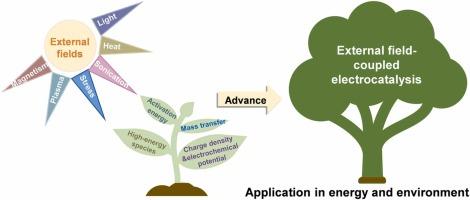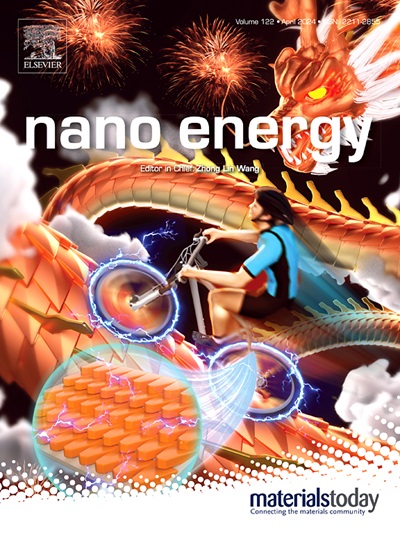电催化中的外能化学
IF 16.8
1区 材料科学
Q1 CHEMISTRY, PHYSICAL
引用次数: 0
摘要
电化学在解决紧迫的能源和环境问题的若干可持续技术中占有重要地位。然而,仅专注于电化学系统改进的常见策略已经达到了极限。外场耦合电催化技术(EFCE)通过外场赋能化学,超越了固有的比例关系限制。我们提出了 EFCE 过程中电荷密度和电化学势、活化能、传质和高能物种的外场能化学描述符。根据这一分类,我们对六种 EFCE 过程的深层机理、材料设计和集成方式进行了总结和讨论,并精选了部分研究成果。最后,我们强调,在下一代电催化过程的机遇与挑战中,多外场耦合电催化有望在 EFCE 中以更大的自由度最大限度地实现外场激发的化学描述。本文章由计算机程序翻译,如有差异,请以英文原文为准。

Extrinsically energized chemistry in electrocatalysis
Electrochemistry is highly involved in several sustainable technologies for addressing pressing energy and environmental concerns. However, common strategies for electrochemical system improvement focused solely on have been reaching limitations. External field-coupled electrocatalysis (EFCE) presents its ability to exceed the inherent scaling relationship limitations by extrinsically energized chemistry. We propose external field-energized chemical descriptors of charge density and electrochemical potential, activation energy, mass transfer, and high-energy species in EFCE processes. According to this classification, the summary and discussion of in-depth mechanisms, material designs and integration manners of six EFCE processes are provided with critically selected research works. Finally, we highlight that among opportunities and challenges in this next-generation electrocatalysis process, multiple external fields-coupled electrocatalysis holds high promise to fulfill the external field-energized chemical descriptors to the maximum in EFCE with more degree of freedom.
求助全文
通过发布文献求助,成功后即可免费获取论文全文。
去求助
来源期刊

Nano Energy
CHEMISTRY, PHYSICAL-NANOSCIENCE & NANOTECHNOLOGY
CiteScore
30.30
自引率
7.40%
发文量
1207
审稿时长
23 days
期刊介绍:
Nano Energy is a multidisciplinary, rapid-publication forum of original peer-reviewed contributions on the science and engineering of nanomaterials and nanodevices used in all forms of energy harvesting, conversion, storage, utilization and policy. Through its mixture of articles, reviews, communications, research news, and information on key developments, Nano Energy provides a comprehensive coverage of this exciting and dynamic field which joins nanoscience and nanotechnology with energy science. The journal is relevant to all those who are interested in nanomaterials solutions to the energy problem.
Nano Energy publishes original experimental and theoretical research on all aspects of energy-related research which utilizes nanomaterials and nanotechnology. Manuscripts of four types are considered: review articles which inform readers of the latest research and advances in energy science; rapid communications which feature exciting research breakthroughs in the field; full-length articles which report comprehensive research developments; and news and opinions which comment on topical issues or express views on the developments in related fields.
 求助内容:
求助内容: 应助结果提醒方式:
应助结果提醒方式:


